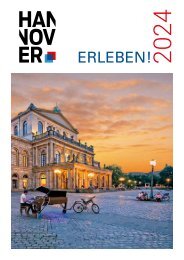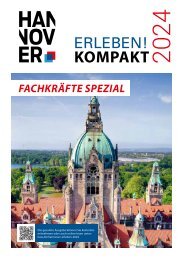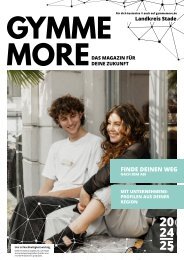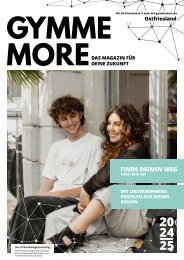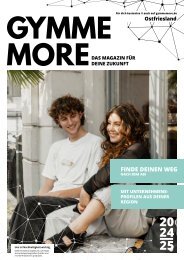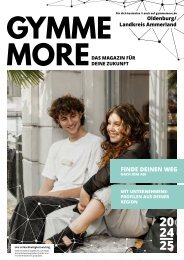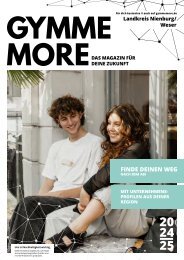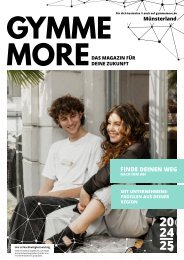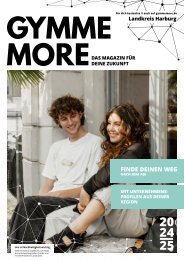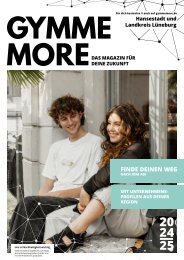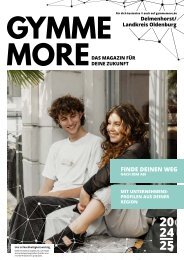Erfolgreiche ePaper selbst erstellen
Machen Sie aus Ihren PDF Publikationen ein blätterbares Flipbook mit unserer einzigartigen Google optimierten e-Paper Software.
Information<br />
Gründungsjahr: 1948<br />
Mitarbeiter: über 120<br />
Schüler: ca. 2500<br />
Fachbereiche:<br />
– elementare Musik -<br />
pädagogik<br />
– Tasteninstrumente<br />
– Saiteninstrumente<br />
– Zupfinstrumente<br />
– Blasinstrumente<br />
– Rockshop<br />
Year founded: 1948<br />
Employees: more than 120<br />
Pupils: about 2,500<br />
Departments:<br />
– elementary music<br />
education<br />
– keyboard instruments<br />
– string instruments<br />
– plucked instruments<br />
– wind instruments<br />
– rock shop<br />
www.musikschule.bremen.de<br />
Musikschule Bremen<br />
An der Musikschule Bremen werden zurzeit ca. 2500<br />
Schülerinnen und Schüler von mehr als 120 erfahrenen<br />
Musikpädagoginnen und -pädagogen dezentral in ganz<br />
Bremen – einschließlich Bremen-Nord – in einer Vielzahl<br />
von Instrumenten unterrichtet. Von der Orchesterarbeit bis<br />
zum Spielkreis ist nahezu alles vertreten. So veranstalten<br />
zum Beispiel die Streicher („Spaß mit Geigen“), die Blockflöten<br />
(„Flauto misto“) und die Querflöten Großauftritte,<br />
bei denen oft über 100 Kinder und Jugendliche mitwirken.<br />
Der Klaviertag ist seit 2001 ein wichtiger Bestandteil in der<br />
Außendarstellung geworden, und der Fachbereich Rock<br />
und Pop konnte im Jahr 2003 erstmals große Erfolge im<br />
Kulturzentrum „Schlachthof“ verbuchen.<br />
Bremen School of Music currently has approx. 2,500 pupils<br />
who are taught to play a wide range of instruments by<br />
more than 120 experienced music teachers in locations<br />
spread out throughout Bremen, including Bremen-Nord.<br />
Practically the full bandwidth is offered, from playing in<br />
the orchestra through to small groups. Large concerts<br />
are organised for example by the strings (“Fun with the<br />
violin”), the recorders (“Flauto misto”) and the flutes, with<br />
often more than 1,000 children and youngsters taking<br />
part. Since 2001, the Piano Day has been one of the<br />
school’s major events, while the rock and pop department<br />
celebrated its first major success in 2003 in the “Schlachthof”<br />
culture centre.<br />
233<br />
than half of Bremen’s cultural funds of around 83 million<br />
Euro each year go to keeping the theatres and large<br />
museums running. Despite all private commitment and<br />
the fact that many creative artists work and live on the<br />
margins of self-exploitation, without public funds they<br />
would not survive. But when the city’s culture department<br />
has to cut back on subsidies again and the existence of<br />
cultural institutions is at stake, Bremen’s specific form of<br />
citizens’ initiative comes to the fore again.<br />
As far as the Bremer Philharmoniker is concerned, in 2002<br />
this led to an Orchester GmbH (orchestra private limited<br />
company) being founded with the participation of the<br />
musicians. In retrospect, the thoroughly positive development<br />
of this traditional orchestra has more than confirmed<br />
the commitment of the musicians. But it is also a specific<br />
characteristic of Bremen’s culture that interested citizens<br />
and creative artists imaginatively and sustainably resist<br />
state intervention: “Anstoß” and “Kulturrat” are the names of





